Besiders
In the Backcountry There Is Freedom
For this pair of Canadian snowboarders, their love of the sport reached new heights once they left the chairlifts, the competitions, and the rules behind.
TEXT Natalie Rinn
PHOTOS Shayd Johnson
In partnership with
On a recent Saturday in December, I sat in the back seat of a Cessna 172 Skyhawk, gliding over a thick forest of fir and spruce trees on Vancouver Island.
In the captain’s seat was Charles Reid, a 28-year-old backcountry snowboarder from Mont-Tremblant, Québec. Next to him sat Rusty Ockenden, another backcountry snowboarder from Summerland, British Columbia, who currently lives on Vancouver Island in a small surf town called Ucluelet — Ukee, as it’s known to locals. Our photographer Shayd and I showed up that weekend to see how they managed to transform an obsession with the backcountry into a way of life.
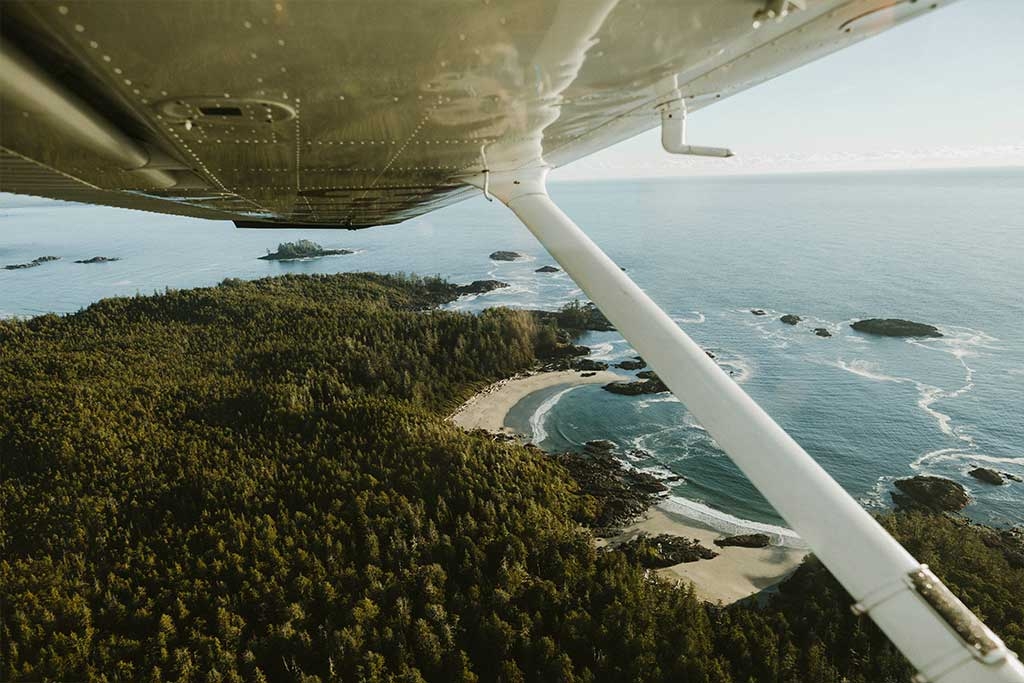
This was my first time in a Cessna, so I was terrified. Charles circled in and around craggy, snow-covered mountain peaks at 10,000 feet, flying so close to their surfaces that I could make out the individual branches on the pretty pines that covered them — an unforgettable experience, but still terrifying.
I’d already survived something scarier: a beach landing. Charles had flown out over the open ocean and had taken a 45-degree downward turn, aiming for a placid strip of beach on an uninhabited island called Vargas. And then, just like that, we were parked on the beach. Undeterred and calm, Charles had handled the plane with complete confidence.
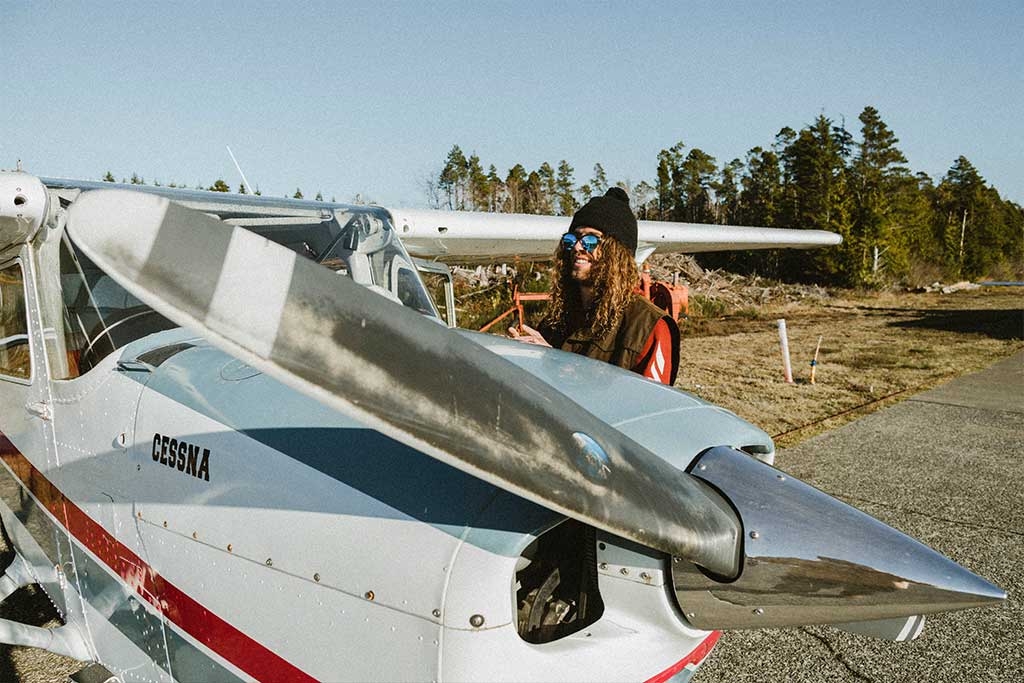
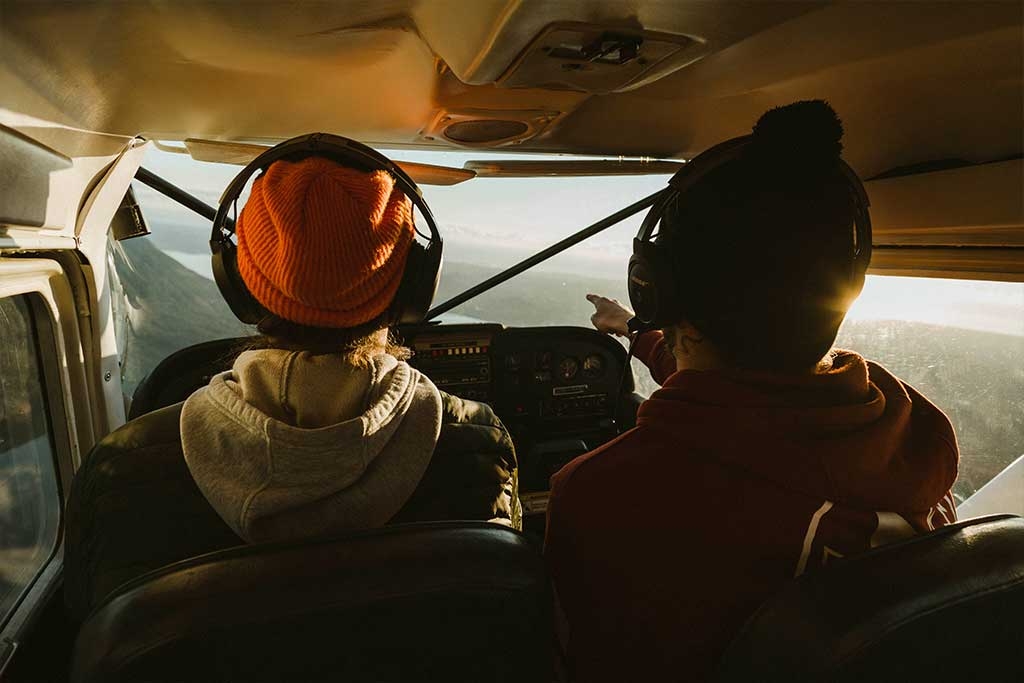

It occurred to me that this kind of flying — soaring above it all with relatively few rules, whenever and however he wanted — was freedom. It also occurred to me that this was not dissimilar to what Charles and Rusty do for work: film backcountry snowboarding in and around Whistler, British Columbia, splitboarding and hiking up to the tops of uncharted peaks, and riding down guided by nothing more than their extensive experience — and their imagination. Later, when we returned to the miniature airport in nearby Tofino, Rusty was already negotiating with Charles to buy half of his plane — he too wanted access to that unregulated freedom.
As we headed back to Rusty’s neat two-storey house in Ucluelet, which he built with his cousin when he decided it was time to create an adult life in a setting he could afford and that supported his outdoor-focused lifestyle, I told Charles that it seemed like whatever he does, he does it to the max. “For me, it’s not a choice,” he said. (He had just described to me how he’d narrowly escaped a devastating injury not long before, when he’d stopped himself from falling off a cliff in the Whistler backcountry.)
“It’s kind of like an obsession. Living life in any other way is not really worth it.”
Both Charles and Rusty have always had this approach to life. Charles grew up in a famous ski resort town, Mont-Tremblant. His family were very supportive of his affinity for sailing down steep mountain faces. His parents were also very active, and led by example: Charles was skiing as soon as he could walk, and snowboarding by five. “If you don’t do sports, you don’t have balance in life,” said Charles. “That’s how we get happiness. That’s how it should be for everyone.”
Rusty, meanwhile, grew up in the interior of British Columbia in a small community called Summerland, and had a similarly active, health-focused family. In town, people who didn’t know his mother’s first name referred to her as the “Runner Lady.” He grew up cross-country skiing with his parents and played on a serious soccer team. But when he discovered snowboarding at 12 — late by today’s standards — his life changed. “I kind of dropped everything,” said Rusty. “I just wanted to be good at a sport. And as soon as I started snowboarding I was like, ‘This is what I want to do.’” Immediately he was doing jumps, rails, boxes, and half-pipes.

Taking Flight
Rusty and Charles had very different entrances into the world of professional boarding. While I was sitting by the wood stove at Rusty’s house, Charles told me his story. At 14, Charles got caught with pot and was suspended from middle school for a month. His parents, ever supportive, made a daring decision. “I don’t mind. I’m not mad,” his mother said. “But,” she continued, “you’re going snowboarding every morning at 8, and I’m picking you up at 4.” After a month of snowboarding for eight hours a day, Charles got his best result at a competition in Québec. A year later, at 15, he travelled with his dad to compete in the U.S. Open. The only English he knew was “TV.” Sponsors took note of his fourth-place overall finish, and, before he knew it, he was travelling the world, competing in Europe, Asia, Scandinavia, South America. He also competed for Team Canada in the 2014 Sochi Olympics.
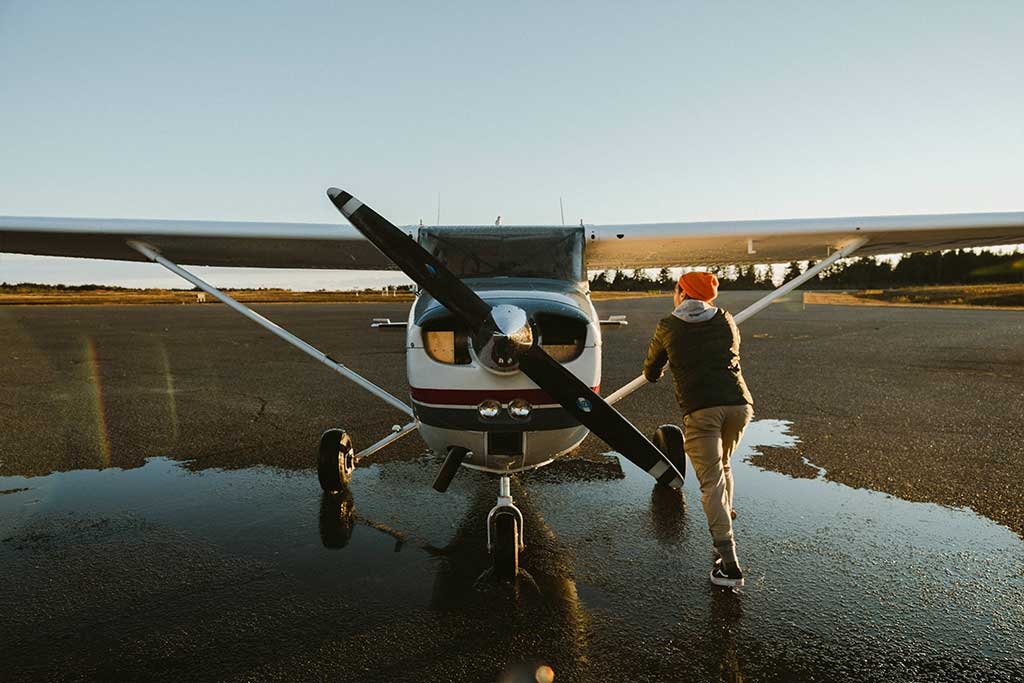
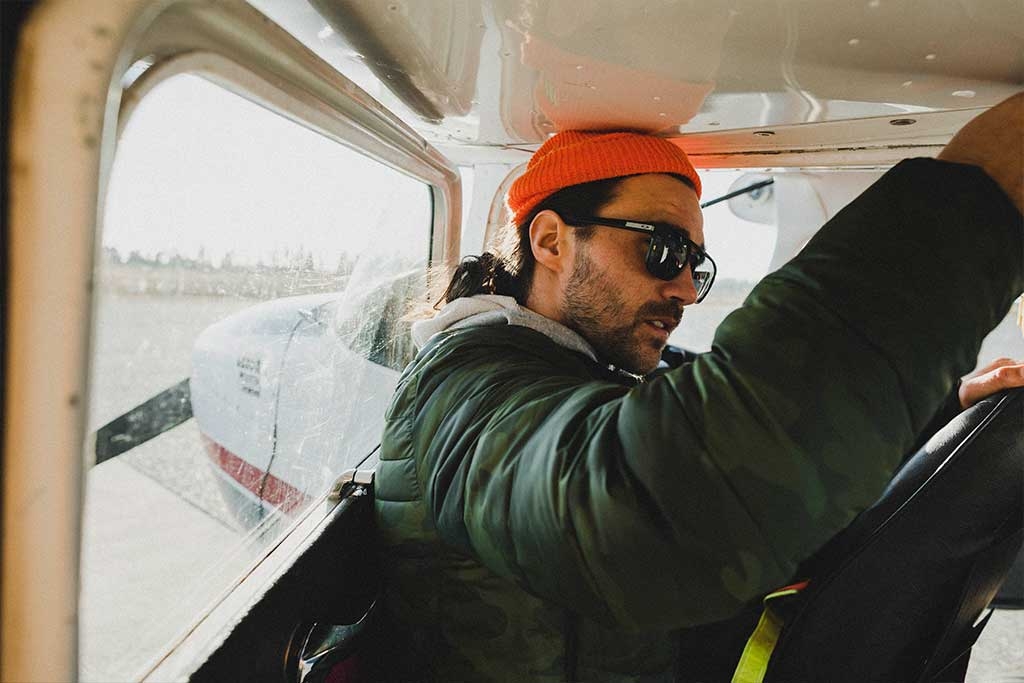
But the world of being wined and dined by sponsors from the age of 15, appearing at endless competitions, taking endless commercial flights, and staying in high-end hotels had its limits. “I don’t think it’s normal for people to travel that much,” Charles said. “I don’t think it’s good for the world, good for the environment.” After a bad knee injury when he was 24, he was told he wouldn’t be able to snowboard again. While he did rehabilitate, he also had time to try new hobbies. He started taking flying lessons and, after a few years, completed his private pilot’s license and fully shifted his focus away from competing.
“I started to do exactly what I wanted to do: flying, backcountry snowboarding, not competing, spending time in mountains, lakes, and rivers — not spending time in airports, five-star hotels, and fancy dinners.”
“It’s a wealthy world,” he said, “the world of snowboarding. I loved it but it just got to be —” He paused, making a gesture that basically meant “enough.” Now he gets to focus on his outdoor obsessions at home, in Canada. “Spending time in the backcountry is my favourite, and for me right now the most rewarding thing is hiking — getting to a peak and looking down,” he said with relished. Just picturing that frightened me, and I told him so. “That’s what people say! But it gives me confidence,” he said with his typical earnestness. “It’s been an awesome learning process so far, and I really want to keep learning.”
And when the day comes that his body can no longer support snowboarding to make a living, Charles says he won’t be finished going on adventures. He’d like to fight wildfires by flying the water bomber planes, CL-415s.
It requires exceptional skill, and a personality that is unafraid of typically scary things. A perfect job, in short, for Charles. As opposed to other piloting options (like flying billionaires around on private jets), fighting climate change and saving lives would be worth it. And in the meantime, he has his Skyhawk for practice. “I use it for adventure,” he said, flashing a ready-for-mischief smile. “It’s an adventure mobile.”
Planning a Transition
Rusty had a very different approach to professional snowboarding: methodical planning. He used to admire a snowboarder from his hometown who was eight years older than him. That snowboarder, in turn, took an active interest in Rusty. One time he gave him a challenge: win a local competition, and Rusty could stay with him for a week in Whistler. Rusty did well enough at that event to secure the invite and, after a week of snowboarding on one of the world’s best hills, he had a new life goal: graduate from high school early, move to Whistler, and do what it takes to turn snowboarding into his career.
For years, Rusty worked two jobs during the warm months in Whistler: eight hours of bricklaying by day and six hours of bartending by night. But this regimented plan worked out: he could spend his winters just filming in the backcountry. “I probably filmed for seven years before I got connected with Oakley,” said Rusty. “Snowboarding is a small corner of a small industry, and filming the backcountry is a very niche thing.” You just have to keep at it and make the kinds of sacrifices he was willing to make, until the right people — like Oakley — take notice. And thankfully, they did.
Despite the unreliability of Rusty’s chosen profession, he’s pragmatic, which means he’s also planning for the future. Four years ago he started his own backcountry production company, The Manboys, so that when he can no longer be filmed, he can do the filming and continue making money from the sport he loves. In a career that involves a lot of risk but has very few guarantees, he takes nothing for granted. “I’m happy how it’s going for me, because I’ve always had to work for what I have,” said Rusty.
But he clarifies that if none of this had happened, if he’d not had his current success, if he hadn’t found a sponsor, he’d still be in Whistler working two jobs so he could snowboard.
“One thing I’ve always felt: if I weren’t making films, I’d still be here, out in the backcountry. For the first seven years I wasn’t making anything, and working two jobs so I could spend all of my money on snowboarding. I wanna be here, obviously, because I’m throwing everything I have at it.”
I marvel that they have both built non-traditional lives for themselves that are out of the realm of possibility for most people. Rusty, with his low-key humour, responded, “Me and Charles are maybe just too stupid to know it was a really bad idea — and then,” he laughed, “it just worked out.”
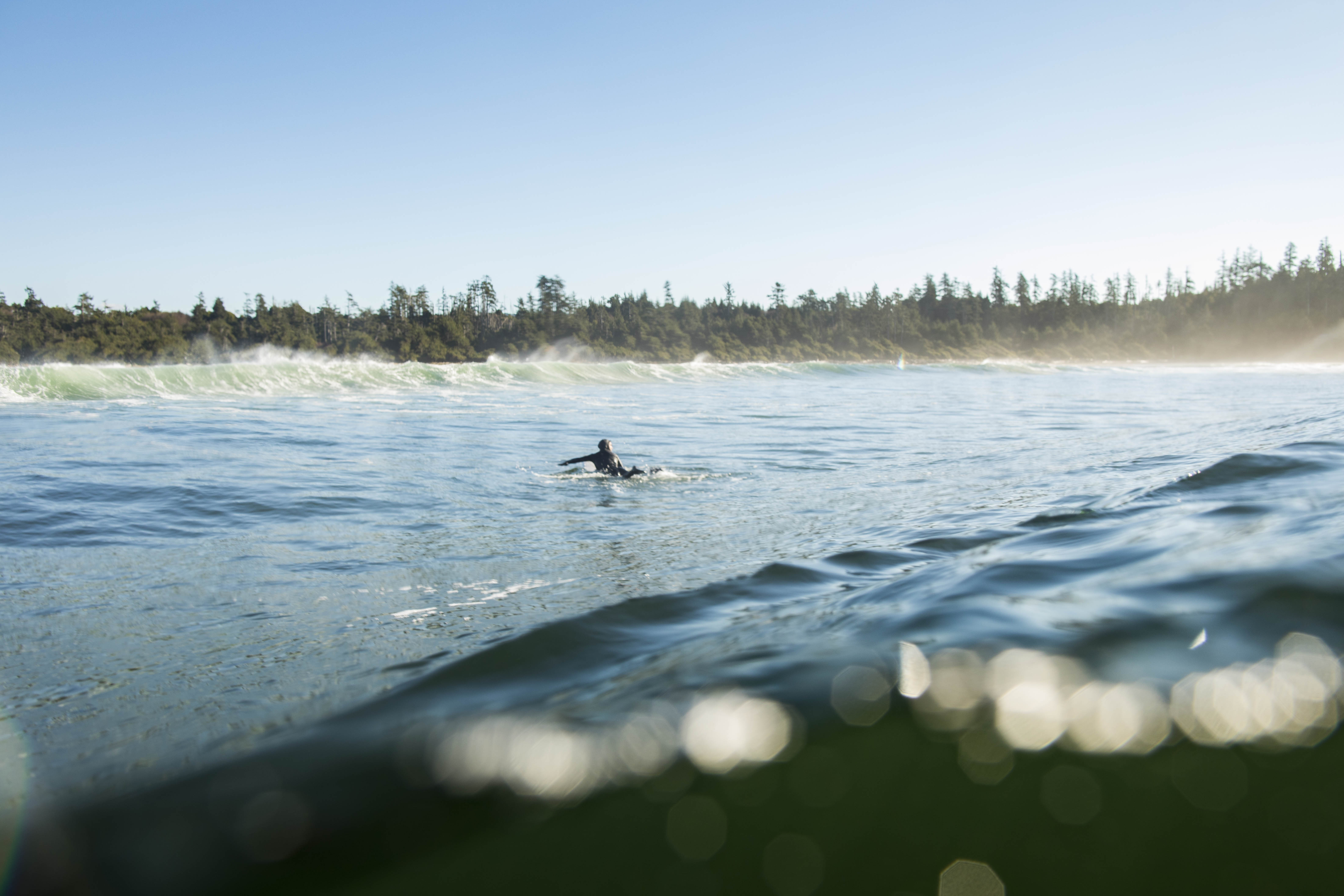
The Biggest Risk is not Taking One
In Ucluelet, I watched Rusty and Charles surf epic December waves. After, Rusty showed us his two-year-old sourdough starter and walked us through prep for the next day’s sourdough (which would accompany his homemade salmon pâté). We then walked out to the shoreline to watch the sunset. The air was fresh and damp, and waves came crashing over dramatic black rocks that jutted into the water. Jagged and tall, one of them also had a nice flat plateau — the best seat in the house if you were willing to scramble over slick rock faces and scale some of their sides. Not a exactly a walk in the park. There were also some picnic tables nearby where we could sit and take in the view.
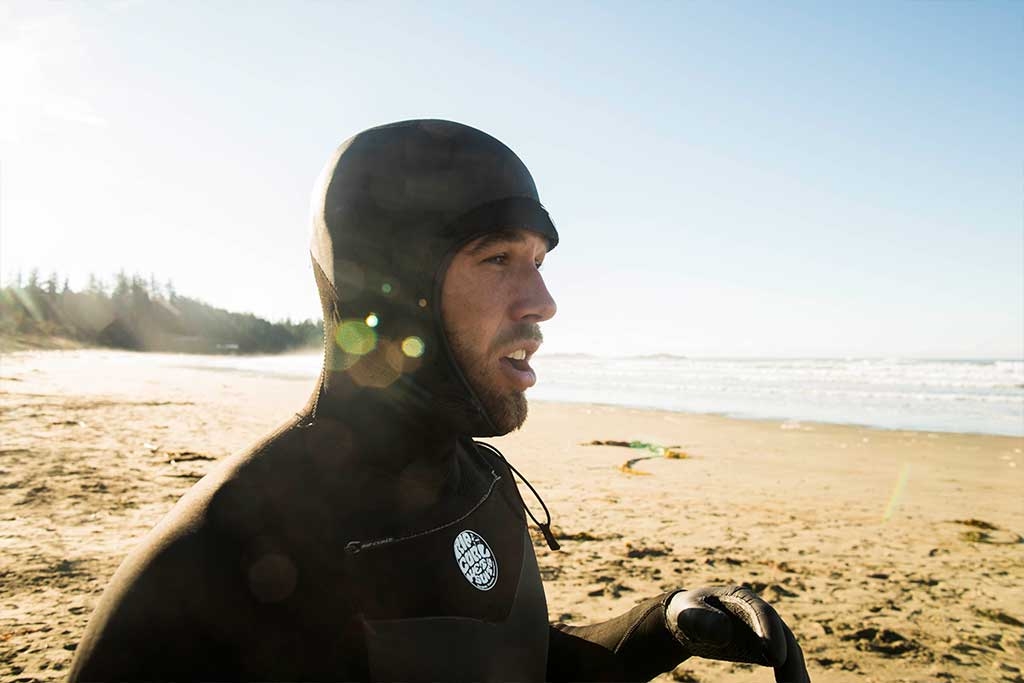
Rusty turned to us. “Are you more picnic table people or rock people?” Not wanting to be a wimp, I answered rock. It took me what seemed like hours to reach the top of the rock plateau that Rusty and Charles had scaled in mere seconds. Finally, though, I reached their spot and cracked a beer. I could have broken a rib, twisted an ankle, fallen along the way. But instead I followed their lead: I took the risk, and none of those things happened. Holding a cold beer in the fresh air while salty waves crashed below me and the sun dipped low on the horizon, I had to say, this particular risk was paying off. Maybe, I thought, I should do that more often.
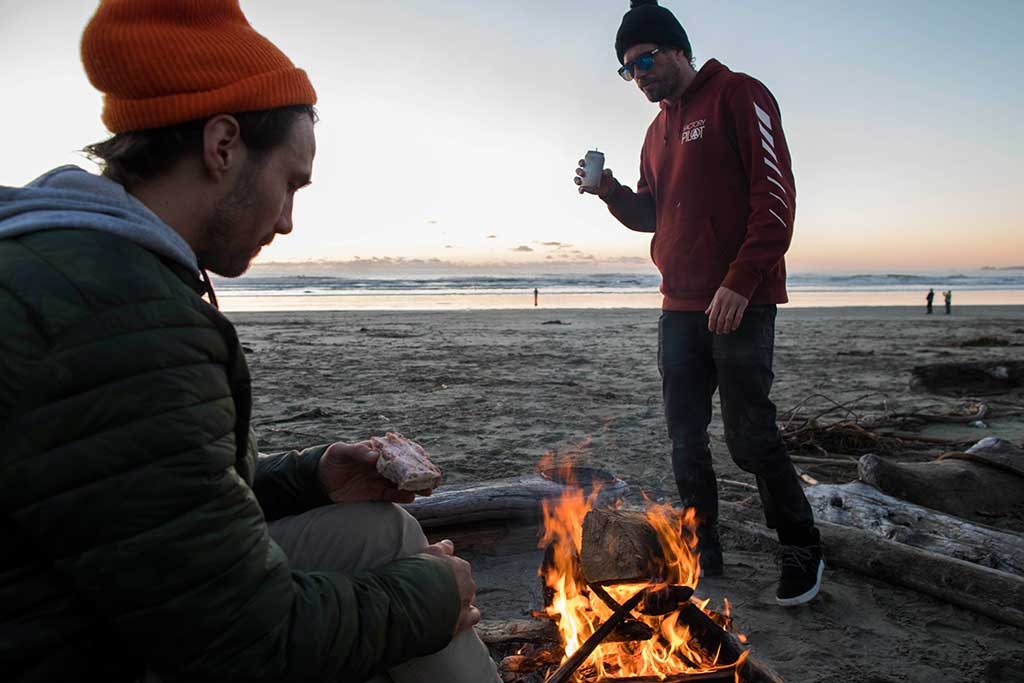
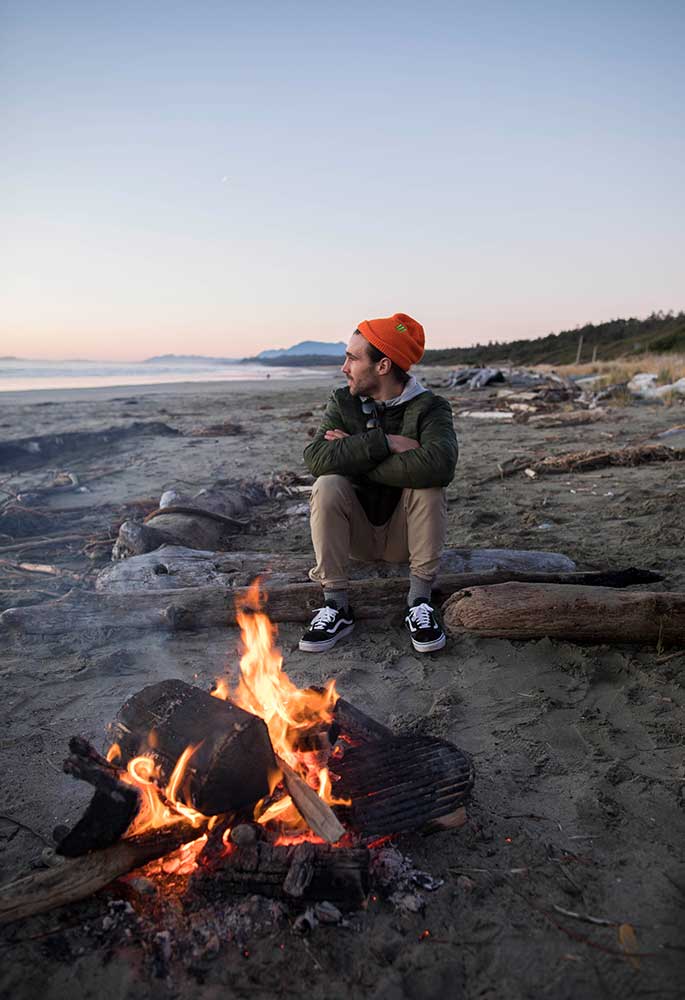

On the final day, we went fly-fishing. We drove out to a remote stretch of the Kennedy River after breakfast burritos and a cup of coffee at a local café. The early morning mist hung low in the distance and the sun hadn’t yet risen above the mountains. Waders on, Charles and Rusty got to work, fighting the robust current to walk out to the middle. Hours passed. My hands were numb. I was ready to quit. But I could tell that Charles, a speck in the distance, wasn’t willing to leave without a prize.
And then, right at the end, right before we all had to go home — because if you are not Charles and Rusty this beautiful life is not in fact your real life — we heard an excited commotion on the far bank of the river. Our photographer had shown up at Charles’ side just as he hooked a pretty Coho salmon on his fly.
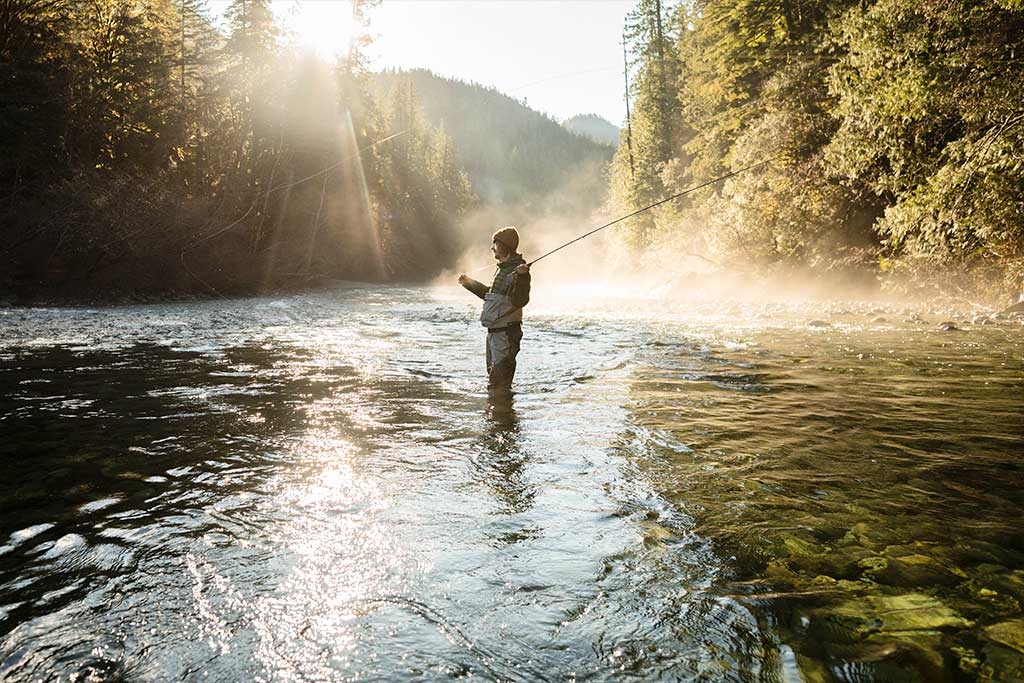
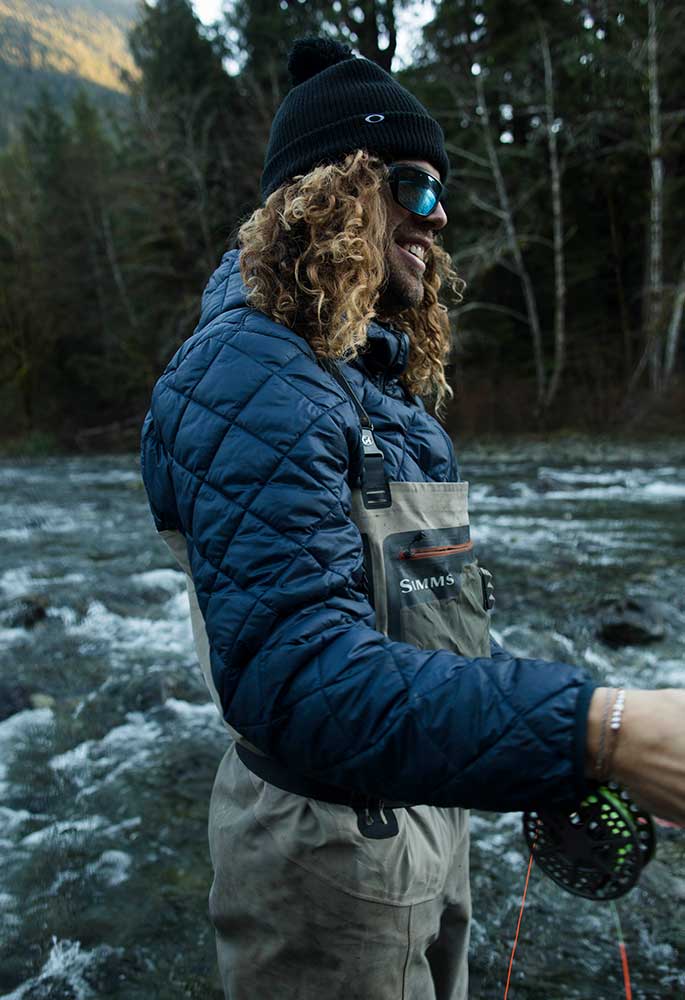
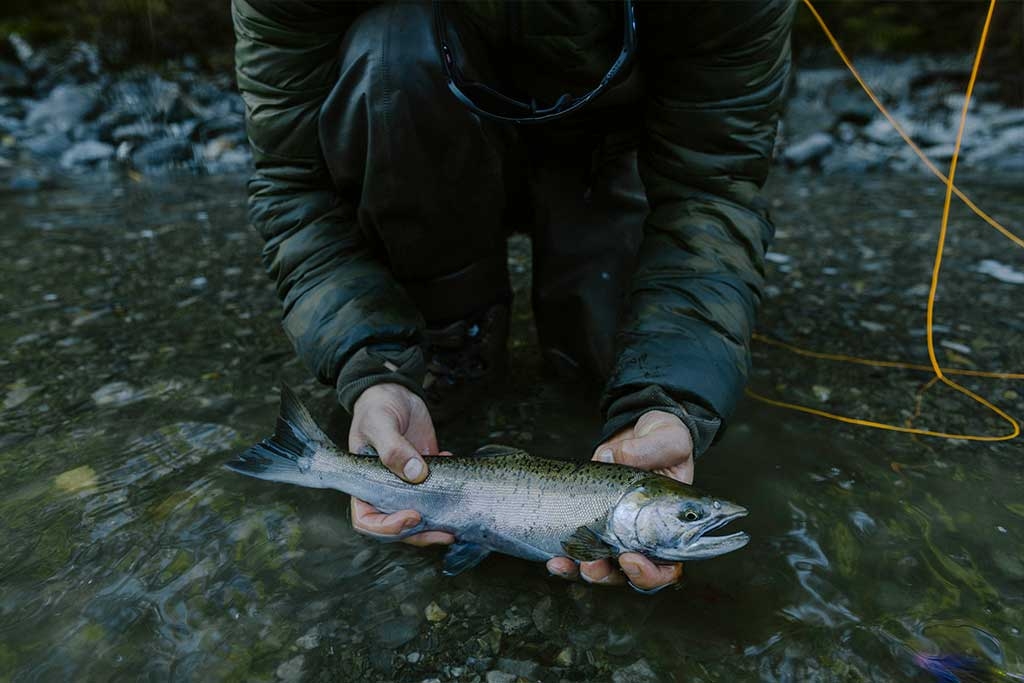
On our walk back to the truck, Charles beamed, flashing his bright neon-pink-and-blue bait in front of me like a priceless treasure. Compared to everything else he and Rusty had done that weekend, this victory seemed so small. But for Charles, it was as stoking as everything else he does. And while I was thoroughly numb, and excited to get into warm pants and a heated car on my way to the airport, I could see that both Charles and Rusty had already taken flight — imagining their next adventure.
________________
Natalie Rinn was born in Minnesota. The former editor-in-chief of Brooklyn Magazine now works asa freelance journalist and editor.Drawn to the idea of jogging on dry terrain, she recently left New York for Los Angeles.
Never Miss Another Issue
Two issues per year
25% OFF previous issues
Free Shipping in Canada







